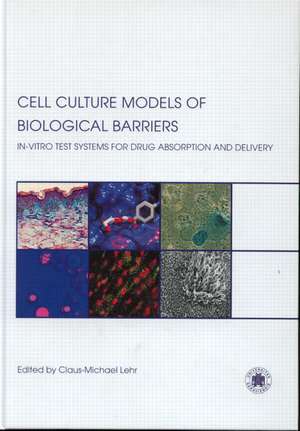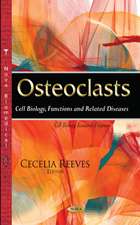Cell Culture Models of Biological Barriers: In vitro Test Systems for Drug Absorption and Delivery
Editat de Claus-Michael Lehren Limba Engleză Hardback – 8 aug 2002
This book provides a practical approach to contemporary cell culture-based in vitro techniques for drug transport studies at biological absorption barriers. It is an invaluable source of information for students attending graduate courses on this subject and pharmaceutical scientists working in industry or in academia.
| Toate formatele și edițiile | Preț | Express |
|---|---|---|
| Paperback (1) | 504.29 lei 6-8 săpt. | |
| CRC Press – 17 oct 2019 | 504.29 lei 6-8 săpt. | |
| Hardback (1) | 1565.84 lei 6-8 săpt. | |
| CRC Press – 8 aug 2002 | 1565.84 lei 6-8 săpt. |
Preț: 1565.84 lei
Preț vechi: 1909.56 lei
-18% Nou
Puncte Express: 2349
Preț estimativ în valută:
299.63€ • 320.40$ • 249.82£
299.63€ • 320.40$ • 249.82£
Carte tipărită la comandă
Livrare economică 17 aprilie-01 mai
Preluare comenzi: 021 569.72.76
Specificații
ISBN-13: 9780415277242
ISBN-10: 0415277248
Pagini: 464
Dimensiuni: 174 x 246 x 26 mm
Greutate: 1.06 kg
Ediția:1
Editura: CRC Press
Colecția CRC Press
ISBN-10: 0415277248
Pagini: 464
Dimensiuni: 174 x 246 x 26 mm
Greutate: 1.06 kg
Ediția:1
Editura: CRC Press
Colecția CRC Press
Public țintă
Academic and Professional ReferenceCuprins
General Aspects of Epithelial Cell and Tissue Culture. Basic Aspects of Cell Growth and Cell Cycle in Culture. Cell Culture Media: Selection and Standardization. Bioelectrical Characterization of Epithelial Cell (Mono)Layers and Tissues. Characterization of Transport Over Epithelial Barriers. Studying Cellular Binding and Uptake of Bioadhesive Lectins. High-throughput Epithelial Cell Culture Systems for Screening Drug Intestinal Permeability. Good Cell Culture Practice (GCCP). Regulatory Acceptance of in vitro Test Systems as an Alternative to Safety Testing in Animals. Regulatory Acceptance of in vitro Permeability Studies in the Context of the Biopharmaceutics Classification System. Models of Specific Epithelial and Endothelial Barriers Relevant to Drug Delivery. Caco-2 Cell Monolayers as a Model for Studies of Drug Transport Across Human Intestinal Epithelium. Transport Studies Using Intestinal Tissue ex vivo. Models of Alveolar Epithelium. Bronchial Epithelial Cell Cultures. In vitro Methodologies to Study Nasal Delivery Using Excised Mucosa. Cell Culture Models of the Corneal and Conjunctival Epithelium. Cell Cultures of the Retinal Pigment Epithelium to Model the Blood-retina Barrier for Retinal Drug and Gene Delivery. Human Skin and Skin Equivalents to Study Dermal Penetration and Permeation. In vitro Models of the Human Buccal Epithelium: the TR146 Cell Culture Model and the Porcine in vitro Model. Drug Transport Across the Blood-brain Barrier: A Molecular and Functional Perspective. BeWo Cells: An in vitro System Representing The Blood-placental Barrier. Emerging Tools for Studying Biological Barriers and Drug Transport. Predicting Drug Absorption by Computational Methods. Confocal and Two-photon Fluorescence Microscopy. On the Application of Scanning Force Microscopy in Cell Biology. Fluorescence Correlation Spectroscopy.
Descriere
Over the past ten years, sophisticated in vitro test systems based on epithelial cell cultures have been introduced in the field of drug delivery. These models have been very useful in characterizing the permeability of drugs across epithelial tissues, and in studying carrier systems for improved drug delivery and enhanced absorption. Compared to in vivo trials, cell culture models are faster, more convenient and cost effective, ethically advantageous, and more easily standardized. This book provides a practical approach to such in vitro techniques. It is an invaluable source of information for graduate students and pharmaceutical scientists in industry or in academia.








